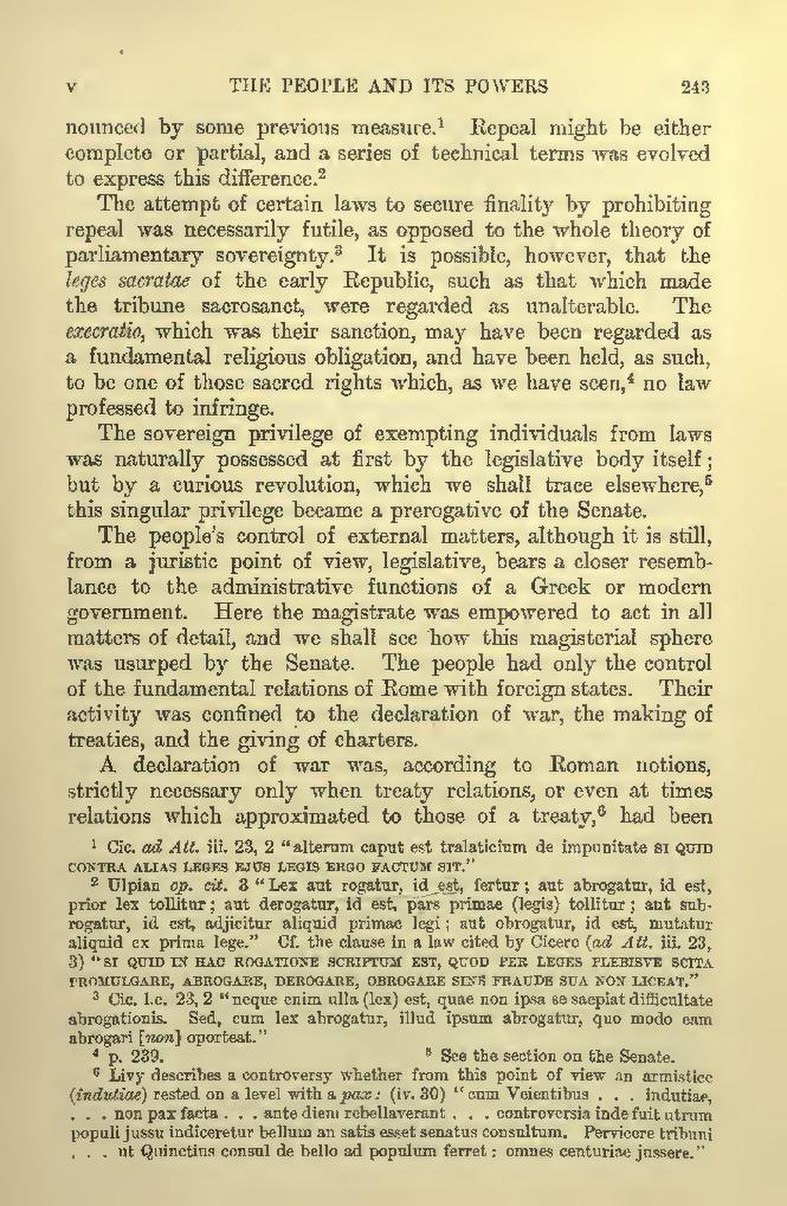- nounced by some previous measure.[1] Repeal might be either
complete or partial, and a series of technical terms was evolved to express this difference.[2]
The attempt of certain laws to secure finality by prohibiting repeal was necessarily futile, as opposed to the whole theory of parliamentary sovereignty.[3] It is possible, however, that the leges sacratae of the early Republic, such as that which made the tribune sacrosanct, were regarded as unalterable. The execratio, which was their sanction, may have been regarded as a fundamental religious obligation, and have been held, as such, to be one of those sacred rights which, as we have seen,[4] no law professed to infringe.
The sovereign privilege of exempting individuals from laws was naturally possessed at first by the legislative body itself; but by a curious revolution, which we shall trace elsewhere,[5] this singular privilege became a prerogative of the Senate.
The people's control of external matters, although it is still, from a juristic point of view, legislative, bears a closer resemblance to the administrative functions of a Greek or modern government. Here the magistrate was empowered to act in all matters of detail, and we shall see how this magisterial sphere was usurped by the Senate. The people had only the control of the fundamental relations of Rome with foreign states. Their activity was confined to the declaration of war, the making of treaties, and the giving of charters.
A declaration of war was, according to Roman notions, strictly necessary only when treaty relations, or even at times relations which approximated to those of a treaty,[6] had beenoporteat."]
- ↑ Cic. ad Att. iii. 23, 2 "alteram caput est tralaticium de impunitate SI QUID CONTRA ALIAS LEGES EJUS LEGIS ERGO FACTUM SIT."
- ↑ Ulpian op. cit. 3 "Lex aut rogatur, id est, fertur; aut abrogatur, id est, prior lex tollitur; aut derogatur, id est, pars primae (legis) tollitur; aut subrogatur, id est, adjicitur aliquid primae legi; aut obrogatur, id est, mutatur aliquid ex prima lege." Cf. the clause in a law cited by Cicero (ad Att. iii. 23, 3) "SI QUID IN HAC ROGATIONE SCRIPTUM EST, QUOD PER LEGES PLEBISVE SCITA PROMULGARE, ABROGARE, DEROGARE, OBROGARE SINE FRAUDE SUA NON LICEAT."
- ↑ Cic. l.c. 23, 2 "neque enim ulla (lex) est, quae non ipsa se saepiat difficultate abrogationis. Sed, cum lex abrogatur, illud ipsum abrogatur, quo modo eam abrogari [non
- ↑ p. 239.
- ↑ See the section on the Senate.
- ↑ Livy describes a controversy whether from this point of view an armistice (indutiae) rested on a level with a pax: (iv. 30) "cum Veientibus . . . indutiae, . . . non pax facta . . . ante diem rebellaverant . . . controversia inde fuit utrum populi jussu indiceretur bellum an satis esset senatus consultum. Pervicere tribuni . . . ut Quinctius consul de bello ad populum ferret: omnes centuriae jussere."
